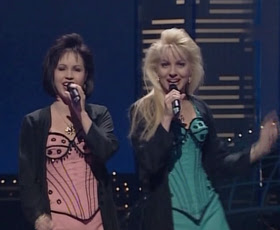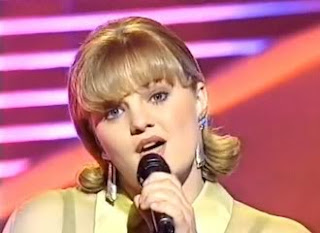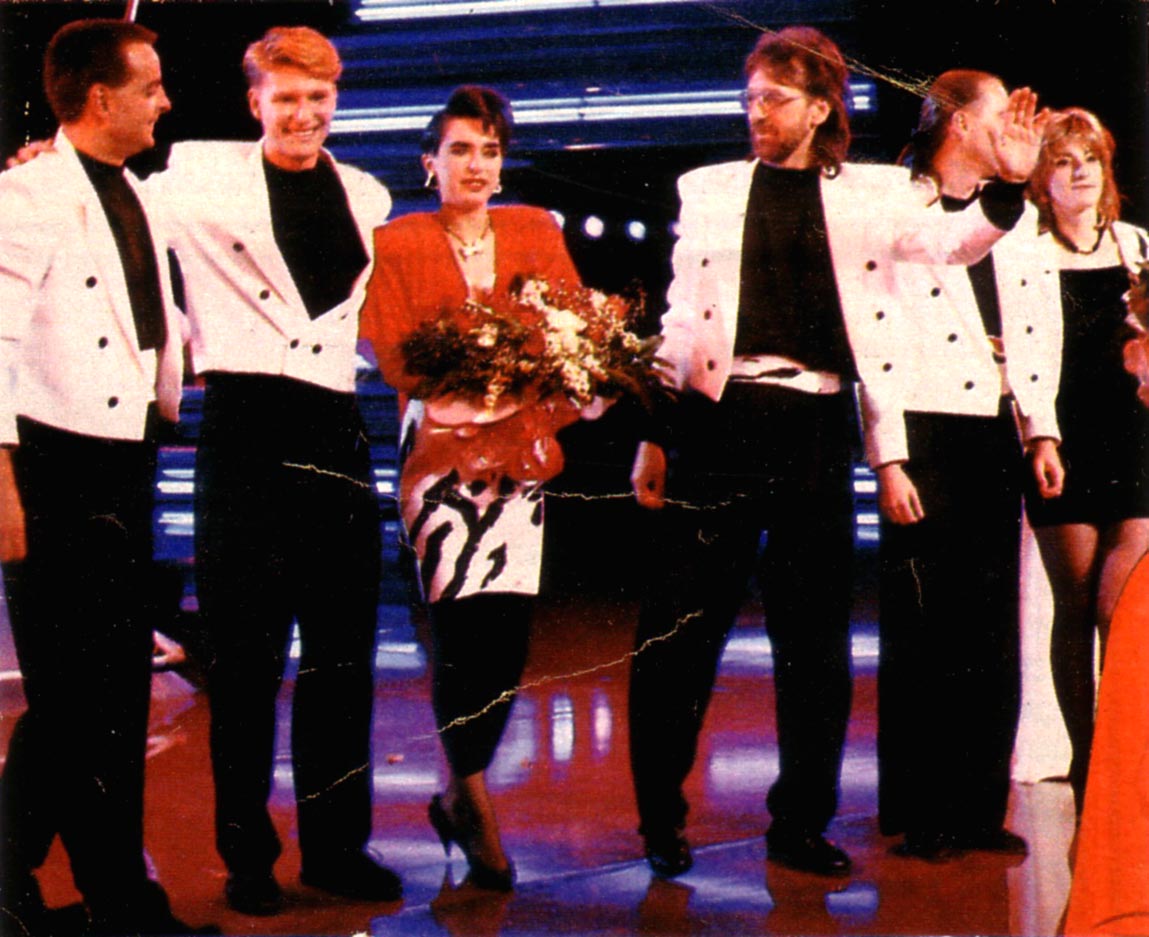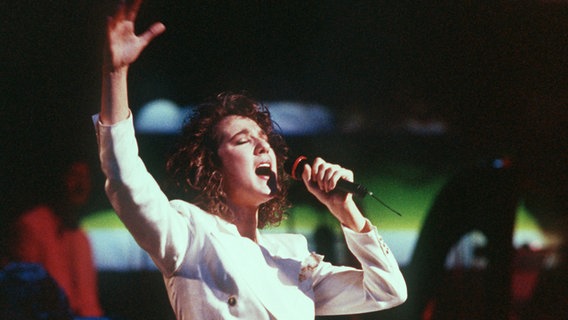Venue: Point Theatre, Dublin, Ireland
Presenters: Cynthia Ní Mhurchú, Gerry Ryan
Orchestra: RTÉ Concert orchestra
Conductor: Noel Kelehan
Director: Patrick Cowap
Scruteneer: Christian Clausen
Host broadcaster: RTÉ
Price presenter: Niamh Kavanagh
Interval act: Riverdance
Duration: 3 hours, 3 minutes
Number of entries: 25
Debuting countries: Estonia, Hungary, Lithuania, Poland. Romania, Russia, Slovakia
Returning countries: -
Withdrawing countries: Belgium, Denmark, Israel, Italy, Luxembourg, Slovenia, Turkey
Winning Song: Rock'n'Roll Kids - Paul Harrington and Charlie McGettigan, Ireland
Voting system: Each country awarded 12, 10, 8-1 points to their 10 favourite songs
MeKaDo
Entries
01. Sweden: Marie Bergman & Roger Pontare - Stjärnorna (13th place, 48 points)
02. Finland: CatCat - Bye bye baby (22nd place, 11 points)
03. Ireland: Paul Harrington and Charlie McGettigan - Rock'n'Roll kids (1st place, 226 points)
04. Cyprus: Evridiki - Íme ánthropos ki egó (11th place, 51 points)
05. Iceland: Sigga - Nætur (12th place, 49 points)
06. UK: Francess Ruffelle - We will be free (Lonely Symphony) (10th place, 63 points)
07. Croatia: Tony Cetinski - Nek'ti bude ljubav sva (16th place, 27 points)
08. Portugal: Sara Tavares - Chamar a música (8th place, 73 points)
09. Switzerland: Duilio - Sto pregando (19th place, 15 points)
10. Estonia: Silvi Vrait - Nagu merelaine (24th place, 2 points)
11. Romania: Dan Bittman - Dincolo de nori (21st place, 14 points)
12. Malta: Chris & Moira - More than love (5th place, 97 points)
13. The Netherlands: Willeke Alberti - Waar is de zon (23rd place, 4 points)
14. Germany: MeKaDo - Wir geben 'ne Party (3rd place, 128 points)
15. Slovakia: Tublatanka - Nekonečná pieseň (19th place, 15 points)
16. Lithuania: Ovidijus Vyšniauskas - Lopšinė mylimai (25th place, 0 points)
17. Norway: Elisabeth Andreassen & Jan Werner Danielsen - Duett (6th place, 76 points)
18. Bosnia & Herzegovina: Alma & Dejan - Ostani kraj mene (15th place, 39 points)
19. Greece: Kostas Bigalis & the Sea Lovers - To trehandiri (14th place, 44 points)
20. Austria: Petra Frey - Für den Frieden der Welt (17th place, 19 points)
21. Spain: Alejandro Abad - Ella no es ella (18th place, 17 points)
22. Hungary: Friderika Bayer - Kinek mondjam el vétkeimet? (4th place, 122 points)
23. Russia: Youddiph - Vechny strannik (9th place, 70 points)
24. Poland: Edyta Górniak - To nie ja! (2nd place, 166 points)
25. France: Nina morato - Je suis un vrai garçon (7th place, 74 points)
Willeke Alberti
The Eurovision Song Contest 1994 was the 39th Eurovision Song Contest and was held on April 30 1994 in the Point Theatre in Dublin, Ireland. The presenters were Cynthia Ní Mhurchú and Gerry Ryan. The pair hosted the evening in French, English and Irish. Paul Harrington and Charlie McGettigan from Ireland were the winners of this Eurovision with a song written by Brendan Graham, Rock 'N' Roll Kids. This was a record sixth victory for Ireland, giving it the outright record number of victories at the Eurovision Song Contest. It was also the first time — and to date the only time — that the contest had been won by the same country in three consecutive years.
Format
The contest opened with a brief film of stars floating in water, fireworks and caricatures dancing around, drinking coffee and biking. The cameras then went live to the venue itself, where dancers dressed in white and wearing caricatured heads of well-known Irish figures, arrived on stage carrying European countries’ flags. The presenters entered the stage spectacularly from a bridge which descended from the roof of the theatre. This year’s video postcards had a literary theme, showing contestants reading, fishing and doing other activities around Ireland. The stage, by Paula Farrell, was four times larger than the Millstreet stage, and its design which included a city scene of skyscrapers and video screens plus a backdrop of an ever changing nightsky was based upon the concept of what a futuristic Dublin might look like with one remaining constant being the river Liffey. Indeed, the floor was painted with a dark blue reflective paint to give a watery effect.
Edyta Górniak
Poland took part for the first time and caused a scandal when Edyta Górniak broke the rules by singing her song in English during the dress rehearsal (which is shown to the juries who selected the winner until 1997). Only six countries demanded that Poland should be disqualified, though the rules required 13 countries to complain before Poland could be removed from the competition. The proposed removal did not occur and Poland went on to come 2nd in the contest, the highest placing that any country's debut song had ever achieved (even the winner in 1956 was Switzerland's second song of the night).
Participating countries
To cope with the increasing number of countries wishing to participate in the contest, for 1994 the European Broadcasting Union ruled that the five lowest-placed countries from the preceding year's contest would not participate. This meant that Belgium, Denmark, Israel, Slovenia and Turkey did not participate this year opening spaces for the overwhelming amount of new countries. This contest also saw Luxembourg withdraw from Eurovision indefinitely. Because Italy and Luxembourg withdrew voluntarily, the bottom 6 of the 1993 Contest were actually relegated.
CatCat
Interval act
The interval act was the first ever performance of the Irish dancing spectacular Riverdance, featuring Michael Flatley and Jean Butler. Although the costs of producing the 1994 contest was only half of what the previous year cost, the success of Riverdance ensured that is was by far the most commercially successful Eurovision ever.
Voting
For the first time in Eurovision history, voting was done via satellite instead of by telephone, and as a result, viewers could actually see the spokespersons onscreen.
When the voting started, Hungary took the lead from the first six juries and was well ahead of all the other countries. However, Ireland powered their way through the score board ending up the winners with a 60 point lead over second-placed Poland.
Sara Tavares
Returning artists
There were four returning artists in 1994. Evridiki represented Cyprus in 1992, Sigga was in 1990 a member of Stjórnin in 1990 and a member of Heart 2 Heart in 1992, Elisabeth Andreassen represented Sweden in 1982 as a member of Chips and in 1985 she represented Norway as a member of Bobbysocks! and Marie Bergman represented Sweden in 1971 and 1972.







































